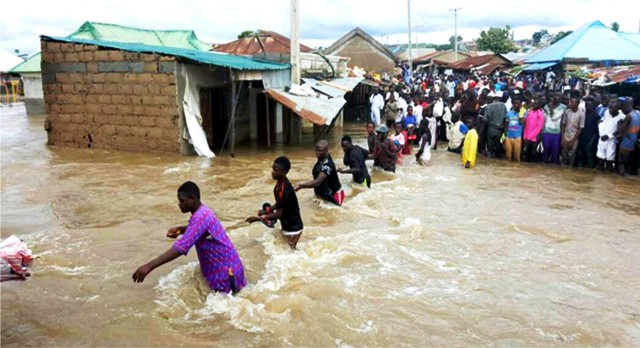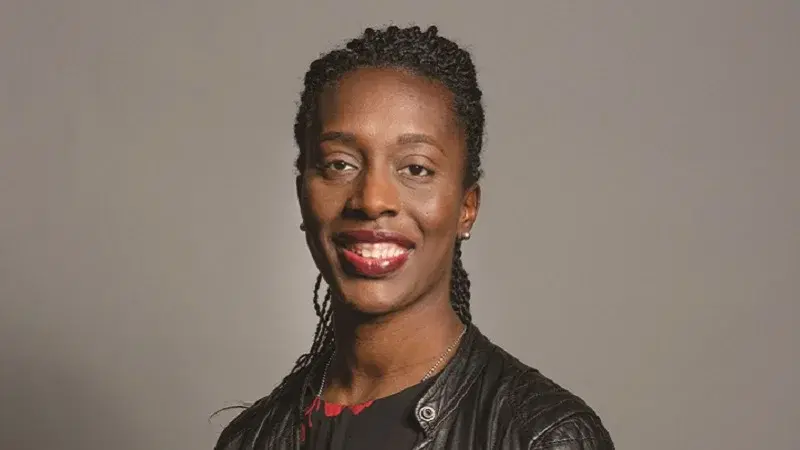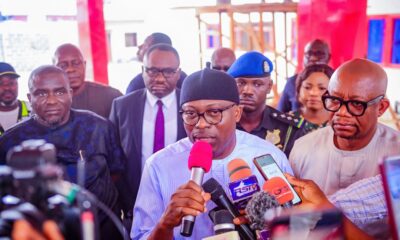News
Severe Flooding Kills 100 In 10 States

Nigeria has declared a national disaster after severe flooding left about 100 people dead across 10 states, the country’s main relief agency said, yesterday.
Heavy seasonal rains have caused the Niger and Benue rivers to burst their banks, inundating communities, farms and trapping tens of thousands of people in their homes.
Speaking with newsmen, yesterday, the Director-General of the National Emergency Management Agency (NEMA), Mustapha Maihaja, declared flooding a national disaster in four states including Kogi, Niger, Delta and Anambra, placing eight others on the watch list.
NEMA made the declaration last Monday, days after the President ordered the agency to declare the situation a national disaster.
Following the order, Maihaja had earlier inaugurated five Emergency Operation Centres (EOC) to facilitate prompt search and rescue operations as well as humanitarian support in the 12 states worst affected by flooding.
The Emergency Response Centres will be responsible for planning, organising, directing and supervising deployment of resources with the affected state governments and local authorities and communities.
The primary objective is to localise the responses and expedite intervention to save lives and facilitate quick recovery.
At the command centre in Abuja, the NEMA DG and other chief executives will be responsible for the formulation of policy and operational guidelines for the conduct of emergency operations in all the worst affected states.
The Nigeria Hydrological Services Agency (NIHSA) had earlier warned that the steady rise in water levels and weather forecast in the coming weeks have put Nigeria at risk of witnessing a recurrence of the catastrophic flooding similar to what it witnessed in 2012.
In 2012, catastrophic flooding had affected up to 30 states in the country and resulted in the deaths of over 300 people and displaced more than two million people, according to data from NEMA.
NIHSA, therefore, believes the country is at risk of a recurrence of the disaster if proper steps are not taken.
With the increase in rainfall and the daily rise in the water levels on both the rivers Niger and Benue, many states have fallen victim to the flooding which has killed many and rendered several others homeless.
In Kogi State, 10 local governments have been submerged by flood in the last 72 hours, according to the state governor, Yahaya Bello.
As a result, 33 camps have been created for the victims numbering about 4,000.
Also in Niger State, more than 100 communities have been submerged, Channels tv reports.
In Kano State, Government has confirmed the death of 31 people and destruction of more than 10,000 houses during the recent flood disaster in 15 Local Government Areas of the state.
Alhaji Ali Bashir, the Executive Secretary of the State Emergency Relief and Rehabilitation Agency (SERERA) disclosed this in an interview with newsmen in Kano .
Bashir said that the cost of the disaster, which wreaked havoc on more than 10,000 houses in the affected areas, was estimated at over N5 billion.
“Thirty one people lost their lives and more than 10,000 houses that are estimated at over N5 billion were affected.
“Most of the affected houses were either totally or partially destroyed,” the Executive Secretary said.
He explained that no fewer than 35,000 farmers were also affected by the disaster in eight local government areas of the state.
In Edo State, at least 30,000 persons have been displaced by flood submerged 42 communities in Esan South East Local Government Area of Edo.
Newsmen report that over 8,000 houses and thousands of hectares of farmland were affected by the flood.
The communities that are mostly are on the bank of River Niger, and had their crops, such as rice, were washed away by the flood.
The council chairman, Mr Victor Emuankhagbon, while lamenting the loss, called for urgent assistance for the victims.
He said because of the enormous destruction occasioned by the flood, there was little or nothing the council could do.
While noting that no fewer than 30,000 persons were displaced by the flood, he said a temporary camp was set up to accommodate the displaced.
“It is huge natural disaster which mainly affected Ifeku Island and Illushi mainland.
The destruction is such that I cannot quantify the loss. “I am appealing to all relevant government agencies, as well as the state and Federal government, to come to the aid of the victims. “The disaster is mind boggling.
Homes are submerged, some destroyed, farmlands and crops washed away.
People don’t have homes to sleep in, no dry land to even cook their meals. “We are in the process of evacuating them to safer locations.
But the job is obviously beyond us; hence we are calling on both the state and federal governments to come to our aid without delay,” said Emuankhagbon.
The council boss listed some of the affected communities to include: Illushi Oji, Oji Ozigono, Oji Awenje, Ajobe, Ajabutu, Owoli, Iyegbi and Ukpodo.
Emuankhagbon noted that four wards out of the ten wards in the council, were affected by the disaster.
Also in Niger State, Emergency Management Agency (NSEMA) yesterday disclosed that 160 communities had been submerged by flood in the state since the rains began in June.
Alhaji Ibrahim Inga, Director General, NSEMA, disclosed this when officials from the United Nations Children’s Fund (UNICEF), Kaduna Field Office, visited him to assess the extent of flooding in the state.
Inga said that the state government had approved release of N28 million to NSEMA to cater for displaced flood victims in Internally Displaced Person (IDP) camps.
He said that the agency had established seven IDP camps for families and persons whose communities were submerged by the flood.
According to the director-general, the IDP camps are located at Zungeru Central Primary School, Maikakaki, Muye, Ceku, Ebbo, Gbaciku and Gungu.
“The flood situation confronting us in Niger is beyond the state’s capacity, even one year of the state’s budget cannot solve the problem, and children and women are the most vulnerable,’’ he said.
Inga said that the Nigerian Air Force, Nigeria Association of Medical Practitioners, Red Cross and the State Child Rights Agency were partnering the agency to give aid to victims, especially children and women.
Earlier, Mr Rabiu Musa, Communication Officer and Focal Person Emergency, UNICEF Kaduna Field Office, said that the team was on assessment of the flood situation in the state.
“Our visit to Niger is to assess the situation and report back on what we have seen for further decision and action,’’ Musa said.
In another development, All primary, post primary and tertiary schools in Ogbaru Local Government Area of Anambra have been temporarily closed down in reaction to the flood disaster in the area.
The council Chairman, Mr Arinze Awogu disclosed this while inaugurating the distribution of relief materials at the council headquarters, Atani yesterday.
Awogu said the closure of the schools was in line with the directive of Gov. Willie Obiano who said schools in the affected areas should close down to avert loss of life.
“We are in an emergency situation and for us, safety of life is paramount, people will not have need for education when they are dead.
The council boss said Ogbaru had taken delivery of buckets, mattresses, mats, mosquito nets and blankets from the State Emergency Management Agency (SEMA) but noted that it was still a far cry from what was required.
Nigeria’s President Muhammadu Buhari said on Monday he had approved the release of three billion naira ($8.3 million, 7.1 million euros) to buy medical and relief materials.
Flooding along the rivers is a frequent occurrence during the annual rains, which fall from May to September.
News
Let’s Approach Regional Development Issues Differently – Fubara …As S’South Govs Host Fubara To 50th Birthday Celebration

Rivers State Governor, Sir Siminalayi Fubara, has sued for a change in the current approach adopted by South South Governors in their pursuit to achieve holistic regional development and economic prosperity.
The governor insisted on de-emphasis in vested individuals’ political interests while looking at the bigger picture of achieving enduring regional integration that will strengthen unity of purpose to change the trajectory of development in the region.
Fubara made the appeal during the meeting of Governors of South-South States, under the auspices of BRACED Commission, at the Bayelsa State Government House in Yanagoa on Tuesday.
This was contained in a statement by the Chief Press Secretary to the Governor, Nelson Chukwudi.
BRACED is an acronym for Bayelsa, Rivers, Akwa Ibom, Cross River, Edo and Delta.
He said: “I want to appeal that if we have to succeed in this drive, we need to keep our political differences aside and understand that the struggle, as at today, is for posterity, for the development of our region.
“It is really sad that in Niger Delta that is the economic base of this country, the construction of a road that you tagged ‘East-West Road’ could be an issue, that we need to beg, protest, and complain to get it fixed. I don’t think it is proper.”
Governor Fubara stated that it is not that the federal authorities do not understand that Niger Delta needs the road but quickly added that they have seen that even the people of the region do not take themselves seriously.
The governor said the moment Niger Delta people stopped playing to the gallery, and place value on themselves, outsiders will have no option than to accord the region and its people due regard.
Fubara said: “On my part, I want to say this: This is not the first time we are meeting. For me, I followed the course of the region meeting in a forum that we tagged “BRACED Commission.”
“BRACED Commission is also one of the bodies that was constituted at that time to support and work out development strategies for this region. But what I am seeing today is just limiting this meeting to only BRACED COMMISSION.
“We need to widen the scope where other leaders of the region should be part of the discussion of the development of the region, and I think this is the direction that will help the region.”
Reading the Communique of the meeting, the new Chairman of the Forum of Governors of South-South States, and Governor of Bayelsa State, Senator Douye Diri, said they support the Federal Government Tax Reform Bills, and urged President Bola Tinubu to extend the Value Added Tax (VAT) sharing percentages to oil and gas derivation.
He stated the Forum’s request to the Federal Government to urge relevant stakeholders and agencies to extend remediation of polluted environment ongoing in Ogoni land to other impacted communities and States in the region.
Governor Diri also said that the Forum resolved to establish a structural regional security network to enhance safety and security, foster stable Niger Delta region conducive for economic growth and prosperity.
Highlight of the event was the hosting of Governor Fubara to a surprise 50th Birthday celebration by the Governors of South-South States at the Government House in Yenagoa.
News
Fubara Lauds Tinubu For Setting Up Education Load Fund … Vows To Ensure Rivers Benefit Maximally From Scheme

The Rivers State Government has applauded President Ahmed Bola Tinubu for conceiving the idea of setting up the Nigeria Education Loan Fund (NELFUND) which has opened up opportunities for youths to acquire tertiary education irrespective of their financial status.
Rivers State Governor, Sir Siminalayi Fubara, gave the commendation while playing host to a delegation from NELFUND who came on an advocacy visit to the Government House in Port Harcourt on Tuesday.
Represented by his deputy, Prof. Ngozi Nma Odu, Governor Fubara said in developed countries it is common for people to go through school with loans which they sometimes pay all throughout their lives, noting that “for us, it is more accessible and more friendly because you would be required to pay back the loan two years after your National Youth Service.
“It is a win-win situation; it is a situation where the youths in Nigeria should not say because my parents are poor or passed away I cannot improve on my educational growth. This offers them a golden opportunity and I am glad you came for this advocacy.”
The governor urged NELFUND to intensify its advocacy to let the people know how they can benefit from it, adding that it is more important when talking about vocational institutions.
“If you look at the developed countries it is people that went to the vocational schools that make so much money, because it is pricey to get somebody to do anything, we need to instil this into our people, our youths, because people sometimes tend to look down on people that went to vocational schools, it should not be,” he said.
Fubara expressed delight with the NELFUND programme and assured that the State Government would do whatever it can to ensure Rivers State benefits maximally from the scheme.
In his remarks, the Managing Director and Chief Executive of NELFUND, Dr. Akintunde Sawyer, informed the governor that they were in Rivers State to seek the support of the State Government towards the loan, stressing that President Tinubu has directed them to ensure no Nigerian student who has the ability and desire to get educated at tertiary level is denied the opportunity due to lack of funding.
He explained that the scheme provides interest-free loans to students who apply, adding that these loans are not repayable until two years after their Youth Service when they must have gotten a job.
News
UK Appoints British-Nigerian As Trade Envoy To Nigeria

A British-Nigerian politician, Florence Eshalomi, has been appointed as the United Kingdom’s trade envoy to Nigeria.
Her appointment makes Eshalomi the second Nigerian to hold the position.
Confirming her appointment on X on Tuesday, she wrote: “It is an honour to have been appointed as the United Kingdom’s Trade Envoy to Nigeria.
“I’m looking forward to building on my close ties with Nigeria to promote a strong and flourishing economic relationship between our two great nations.
“I am looking forward to strengthening the UK’s relationship with Nigeria to explore shared growth and opportunities for both countries.”
Announcing the appointment in a statement on Tuesday, Jonathan Reynolds, the UK’s Business and Trade Secretary, said the decision was aimed at attracting investment into the UK and boosting economic growth.
“I’ve launched a new team of trade envoys who will use their experience, expertise, and knowledge to unlock new markets around the world for British businesses, attract investment into the UK, and ultimately drive economic growth,” Reynolds said.
Eshalomi, 44, is an MP representing the Vauxhall and Camberwell Green constituency.
She holds a Bachelor of Arts (Hons) in Political and International Studies with Law from Middlesex University.
-
Business3 days ago
FG Seeks partnership With World Economic Forum On Gas Pipeline Project
-
Business12 hours ago
Data Privacy Ecosystem Can Drive Trillion Dollar Economy – NDPC
-
Rivers8 hours ago
PHCCIMA Breaks Down Rivers 2025 Budget
-
Rivers3 days ago
Kirike Chiefs Endorse Ogube’s leadership … As Chairman Sues For Unity
-
Politics11 hours ago
Diri Emerges South-South Governors Forum Chairman As Forum Gives Nod To FG’s Tax Reform Initiative
-
Business8 hours ago
NUPRC Targets N15tn Revenue In 2025
-

 Featured2 days ago
Featured2 days agoFG Begins Recruitment Into Federal Civil Service
-

 News10 hours ago
News10 hours agoFubara Lauds Tinubu For Setting Up Education Load Fund … Vows To Ensure Rivers Benefit Maximally From Scheme

